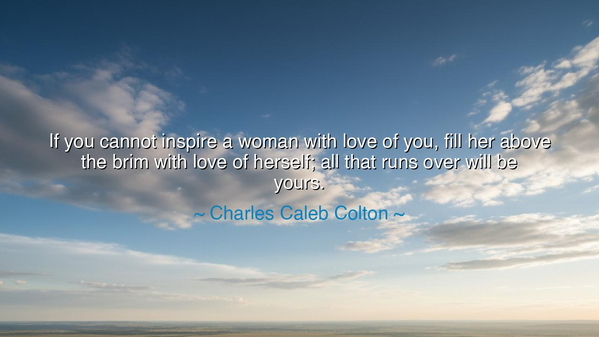
If you cannot inspire a woman with love of you, fill her above
If you cannot inspire a woman with love of you, fill her above the brim with love of herself; all that runs over will be yours.






Charles Caleb Colton, the English clergyman and aphorist, once declared with piercing insight: “If you cannot inspire a woman with love of you, fill her above the brim with love of herself; all that runs over will be yours.” In this paradoxical wisdom lies the ancient truth of love—that affection cannot be forced, but it may be awakened indirectly, through the nurturing of the other’s spirit. To inspire love is not to demand it, but to cultivate it as a gardener tends the soil, allowing it to grow where it will.
The ancients themselves spoke of this. They taught that the highest gift a lover can offer is not possession, but self-knowledge and self-respect to the beloved. When one is made to see their own worth, their own beauty, their own radiance, their heart overflows with joy. And from this overflowing, affection spills outward, touching naturally the one who helped kindle it. Thus, Colton reveals that true power in love lies not in conquest, but in empowerment.
To fill her with love of herself is to heal the heart’s deepest hunger. Many souls, uncertain of their value, crave recognition and affirmation. The one who provides this becomes not only companion, but catalyst of her strength. And when the vessel of self-love is full, it cannot contain itself—it spills over, flowing into gratitude, loyalty, and devotion toward the giver. This is no trickery, but a sacred alignment of affection with truth.
Yet Colton’s words also carry caution. For to seek only to be adored is vanity, but to nurture the beloved’s self-love is generosity. The former binds, the latter frees; and paradoxically, in freeing another, one wins a truer and deeper form of love. The ancients knew this balance, for they warned that love born of flattery fades, but love born of awakening endures.
Let the generations remember: the surest way to gain love is not to demand it, but to give it in the form of affirmation. Help another see the worth they already carry, and what spills beyond will be your reward. In this teaching of Colton lies a timeless truth: that the greatest victory in love is not possession, but the overflowing of a heart made whole.






RRi
I like how this quote puts the focus on self-love, but do you think it’s possible for a relationship to only thrive when one person is fully self-sufficient in their love for themselves? Shouldn’t the process of loving and being loved by another help nurture self-love too? Maybe it’s about balance—how do you think love from another person and self-love work together?
QPQi Phu
Charles Caleb Colton's quote focuses heavily on self-love, but what happens when someone’s capacity for self-love is hindered by past trauma or negative experiences? Can true love still thrive in such circumstances, or is it essential that the individual already feels whole? I’m curious if the quote’s idea could help or hurt people who struggle with their self-esteem.
DNTran Nguyen Duy Nguyen
This quote seems to imply that personal fulfillment is the key to a successful relationship. But what if a woman has trouble reaching that level of self-love? Can someone truly be expected to 'overflow' with love for others if they don’t already have that foundation? It makes me think about the balance between personal development and romantic love—how much should one depend on the other?
NMVy - 9/2 Nguyen Ngoc Minh
What do you think about the idea that when a woman is 'filled above the brim' with love for herself, that love will overflow into the relationship? Is this empowering or does it put too much emphasis on self-love, potentially neglecting the importance of mutual love and respect in a partnership? Could this idea be a bit one-sided, or does it encourage self-improvement in relationships?
THThuy Hoang
It’s interesting how this quote portrays self-love as the foundation for any deeper emotional connection. But, does it oversimplify the complexity of relationships? I feel like it suggests that the love a partner offers is secondary to the love one has for themselves. Do you think it’s possible to inspire someone to truly love themselves through actions and words alone? Or is it an internal journey?